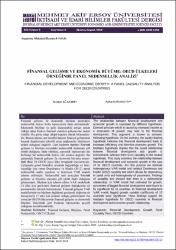Financial development and economic growth: A panel causality analysis for OECD countries
Künye
Ağazade, S. & Karakaya, A. (2019). Financial development and economic growth: A panel causality analysis for OECD countries. Journal of Mehmet Akif Ersoy University Economics and Administrative Sciences Faculty, 6(2), 471-484. https://doi.org/10.30798/makuiibf.526723Özet
The relationship between financial development and economic growth is expressed by different hypotheses. Demand pressure which is caused by increased income as a conclusion of growth may lead to the financial development. This argument is known as demand-following hypothesis. on the contrary, the supply-leading hypothesis indicates that financial development leads to increased efficiency and therefore promotes growth. the feedback hypothesis implies that the causal relationship between financial development and growth is bidirectional, whereas there is no causality in the neutral hypothesis. This study examines the relationship between financial development and economic growth in the case of 34 OECD countries. For this purpose we estimate heterogeneous VAR model and conduct Dumitrescu and Hurlin (2012) causality test which allows for dependency in panel units and heterogeneity of parameters. Findings of causality test showed that there is a bidirectional relationship. in VAR model that estimated for growth, parameters of lagged financial development were found to be significant for 11 countries. in financial development VAR model, lagged growth variable coefficients of 17 countries were significant. These findings support the feedback hypothesis for OECD countries in financial development and economic growth relationship.


















